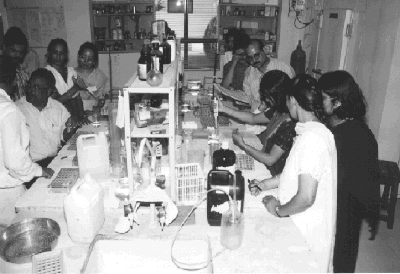From the Desk of Coordinator, Bioinformatics Centre
Manipulation of Gene – Boon or Bane
Genetically modified organisms (GMOS), in particular microbes are being routinely used in the production of therapeutics. Recombinant bacterial products such as human insulin, plasminogen activator, interleukins, interferons are finding different clinical uses. Similar to bacteria, GM crops are also coming up very fast in agriculture with several genes available for designer crops. These crops are supposed to be endowed with higher yields, nutritional quality and resistance to insects and pests. Herbicide-resistant sugarbeet, insect-resistant cotton and tomato are in commercial use. In animal husbandry too, GM animals are on their way with designer eggs, salmon fish with human growth hormone, fast growing catfish, oysters subject to regulatory approval for human consumption. People are concerned with MNC controlled high-technology and commerce driven GM food for its safety and long term effects on human health and on the ecological environment. The merits of gene-tech insulin verses natural insulin are being debated. Dr. Teuscher, Founder President of the Swiss association for the preservation of natural insulin and other experts say as many as 10 to 20% of gene-tech insulin users can encounter a variety of such side effects, collectively termed as ‘hypoglycemia unawareness’ leading to death in diabetics during sleep due to severe blood sugar drop. (U.S. FDA rules require a warning about hypoglycemia to be printed on package). As production of natural insulin is more expensive, insulin producers are switching to gene-tech variety. Another example is that of genetically modified crop, the BT cotton. The first crop’s indifferent performance in Maharashtra, Gujrat, Karnataka and Andhra Pradesh has been disappointing, possibly due to lack of field studies in real field situation compared to optimal conditions in experimental fields. The BT cotton seed is costlier compared to good hybrid seeds and caused heavy losses to the farmers. Suman Sahai, President, Gene compaign, questions the clearance and introduction of the GM crop by Mahyco-Monsanto without thorough study on its suitability to Indian conditions and long term implications. These experiences teach us to tread cautiously while working with manipulation of genes and introducing GM foods into normal diets, without surrendering to aggressive marketing strategies of MNCs.
![]()
April 1, 2024
Dr. B. C. Harinath

Participants in
action in the 9th training course on ‘Immunodiagnostics for
Infectious Diseases’ held during February 17-22,2003.